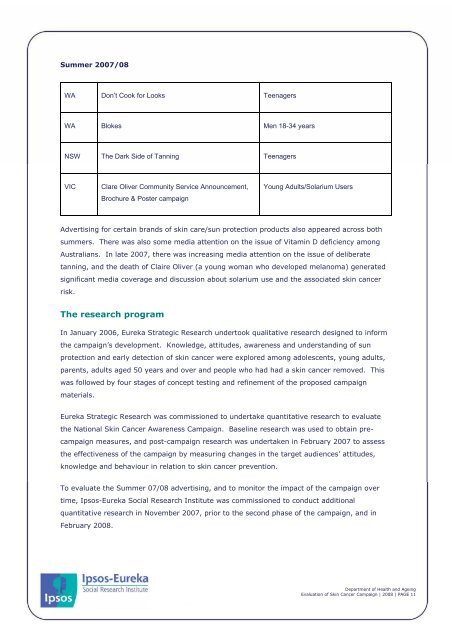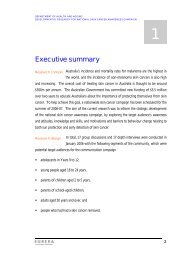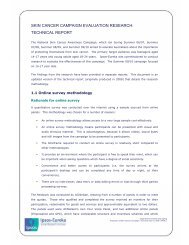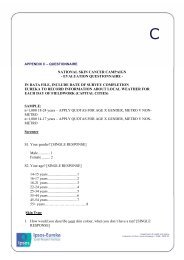2. Research context (PDF 74 KB) - National Skin Cancer Awareness ...
2. Research context (PDF 74 KB) - National Skin Cancer Awareness ...
2. Research context (PDF 74 KB) - National Skin Cancer Awareness ...
You also want an ePaper? Increase the reach of your titles
YUMPU automatically turns print PDFs into web optimized ePapers that Google loves.
Summer 2007/08<br />
WA Don’t Cook for Looks Teenagers<br />
WA Blokes Men 18-34 years<br />
NSW The Dark Side of Tanning Teenagers<br />
VIC<br />
Clare Oliver Community Service Announcement,<br />
Brochure & Poster campaign<br />
Young Adults/Solarium Users<br />
Advertising for certain brands of skin care/sun protection products also appeared across both<br />
summers. There was also some media attention on the issue of Vitamin D deficiency among<br />
Australians. In late 2007, there was increasing media attention on the issue of deliberate<br />
tanning, and the death of Claire Oliver (a young woman who developed melanoma) generated<br />
significant media coverage and discussion about solarium use and the associated skin cancer<br />
risk.<br />
The research program<br />
In January 2006, Eureka Strategic <strong>Research</strong> undertook qualitative research designed to inform<br />
the campaign’s development. Knowledge, attitudes, awareness and understanding of sun<br />
protection and early detection of skin cancer were explored among adolescents, young adults,<br />
parents, adults aged 50 years and over and people who had had a skin cancer removed. This<br />
was followed by four stages of concept testing and refinement of the proposed campaign<br />
materials.<br />
Eureka Strategic <strong>Research</strong> was commissioned to undertake quantitative research to evaluate<br />
the <strong>National</strong> <strong>Skin</strong> <strong>Cancer</strong> <strong>Awareness</strong> Campaign. Baseline research was used to obtain precampaign<br />
measures, and post-campaign research was undertaken in February 2007 to assess<br />
the effectiveness of the campaign by measuring changes in the target audiences’ attitudes,<br />
knowledge and behaviour in relation to skin cancer prevention.<br />
To evaluate the Summer 07/08 advertising, and to monitor the impact of the campaign over<br />
time, Ipsos-Eureka Social <strong>Research</strong> Institute was commissioned to conduct additional<br />
quantitative research in November 2007, prior to the second phase of the campaign, and in<br />
February 2008.<br />
[ Department of Health and Ageing<br />
Evaluation of <strong>Skin</strong> <strong>Cancer</strong> Campaign | 2008 | PAGE 11





